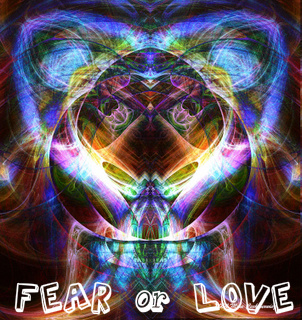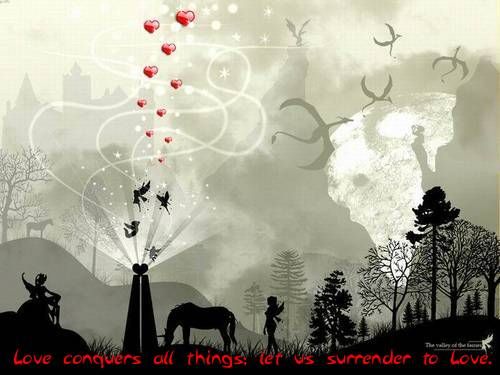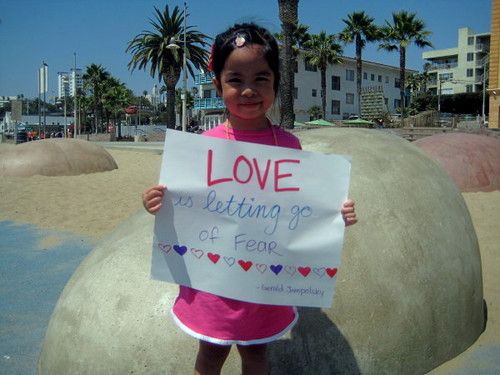
God of Fear and God of Love
by Dr. Richard Moss
Fear is a great god, one that we can never defeat if we resist or react to it in any way. Learning to grow faith is an incremental process. I know of no one who has fully conquered fear. I certainly haven't. But I know that if, at the end of a lifetime, our faith has grown a measure no bigger than just the space between two hairs on our heads, we will have to a degree transformed the very fabric of reality for ourselves and everyone else.
As this power to resist fear grows within us, we begin to realize a greater god: the god of love. I am using the term god here to refer to the dominant unconscious force that influences us at a given stage in our lives. We could say that, at this point in history, in the majority of us, the soul lives under the sway of fear.
Yet there is a growing minority whose souls obey the god of love, and the primary evidence of this is that our lives are dominated by the yearning to know who we really are. Love is not mere consolation for our otherwise troubled lives. Nor is it the sentimental, but pleasurable, "mush" it has been reduced to in popular culture. Love, as Walt Whitman wrote, is "the kelson of the creation." The kelson is the keel, or backbone, of a sailing ship that unites all the ribs to form the hull.
Love is the backbone of reality: it is the unbroken connectedness of all things, everything in relationship to everything else. Nothing is ever in exile from it; there is nothing in life that does not belong here, in reality. Even fear.
When love is our god, we have permission to be in relationship to everything, even the darkest places of dread and terror. When love is our god, we can enter into conscious relationship to any aspect of our experience and consciously suffer it until we realize that the very fabric of reality is love. There is always that within each of us that is greater than fear in all its forms.

Our obsession with survival and security always ultimately leads us back to fear and all its minions — power, control, righteousness, jealousy, neediness, greed, blame, hate, and revenge. We live in endless hope for imagined security, for freedom from an endless legion of external threats, but in that very hope hides the root fear, that which we have not yet turned to meet and hold. Hope can never break us out of the cycle of survival.
While fear thrives on obedience, the god of love asks only for conscious relationship, and not to an abstract idea of God, but to the immediacy of every moment. When fear is overlord of a particular moment, filling our minds with endless worries and demanding all kinds of actions in the service of a hoped-for outcome or reward, love will hold and support our aware selves as we turn trembling to stand and face fear itself, straight on, whatever its guise. In facing fear, we gradually become free of the cycle of fear and hope and begin to fulfill the higher purpose of our human existence: to reveal and express the fullness of our beings.
But what of those of us who derive our faith from belief in God or Jesus or any other symbol that represents to us a reality greater than ourselves? Experiencing faith in this way entails projecting our own self-..transcending capacity onto a symbol of salvation and then deriving feelings of inspiration and sustenance from those symbols. But even though in our survival-..oriented culture this passes for true faith, it is really just borrowed faith: we borrow it from something external to us, something we can think or imagine, without realizing that that which resided in Jesus and all the great souls resides as well in ourselves. This fundamental consciousness, which everyone has the potential to realize, is clearly what Jesus was referring to when he said, "Before Abraham was, I Am" (John 8:58).
Depending on borrowed faith when we do not ultimately have faith in ourselves, we remain prisoners of the god of fear, even as we worship the icons we have dedicated to the god of love. We claim to know what God wants, but we remain ignorant of our own essence. We continue to be rooted in a survival-based consciousness. There is a deeper faith that comes from exercising the power of awareness to find our own source, what existed prior to anything whatsoever that we have believed. If we inquire deeply enough to realize that our conditional faith comes at the price of giving away our own divinity, then we meet the true test of faith: we finally face our egos' primal fear of being utterly and hopelessly extinguished. When we face this fear, we ultimately come to realize the true source of our beings.

The Problem with God
It is always a mistake to separate our own consciousness from our god-ideas. Jesus himself said, "Whoever knows the All but fails to know himself lacks everything." Whatever we believe about God, we are knowingly or unknowingly speaking about ourselves, and frequently it is our survival personalities that influence what we say. If we want a god to support us in battle or our nationhood or our religious supremacy, we invent a god who legitimates our cause. If we want a god who exonerates us and forgives us, we open our hearts to a god who does that. If we want a god who is pro-life or pro-choice, we create this god in our minds. And once we have created this god, we always construe evidence or scripture to support our belief.
But it is not really a question of what God does or doesn't want. For the religious person, God excites the mind; for the mystic, God stops it. When we speak of God from a spiritual perspective, we refer to that which, when we turn our attention completely toward it, ends all thought and instead reflects us back to the ineffable source of our consciousness, the true beginning of ourselves. God in this sense is the ultimate mirror: whatever we see in it is God. We must embrace every aspect of ourselves until, ultimately, we each know that I and God are one.

Love & Light,
♥Angel Love♥

Reposted with LoVe & Gratitude:
♥Stassy♥Love♥
Comments
Post a Comment